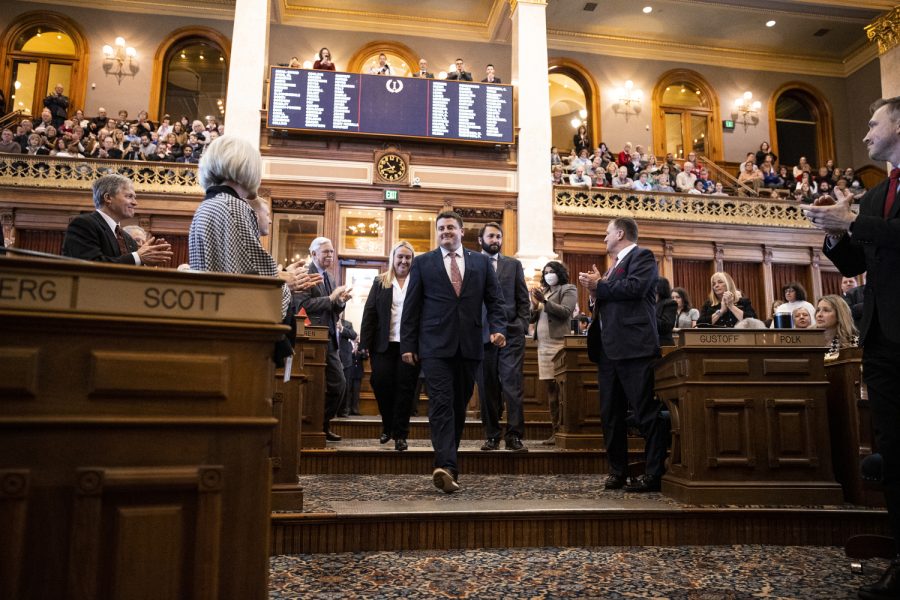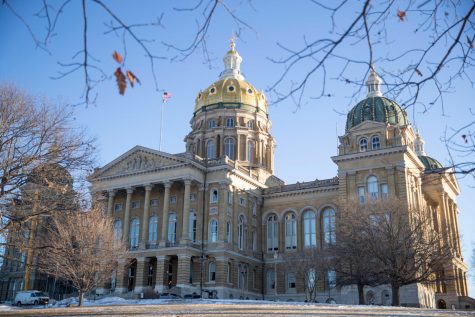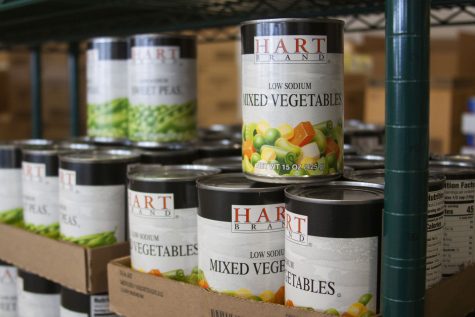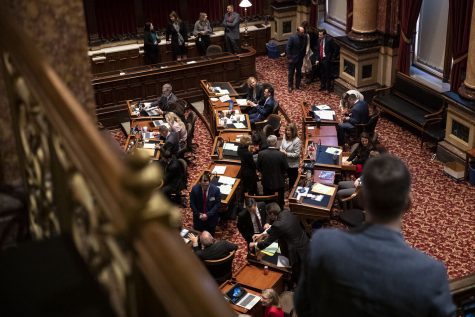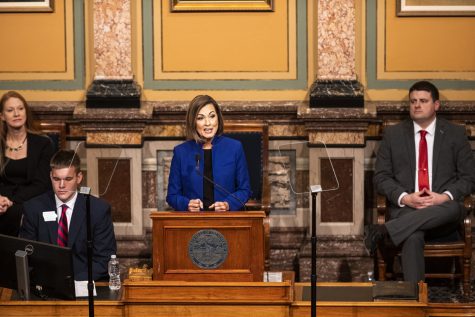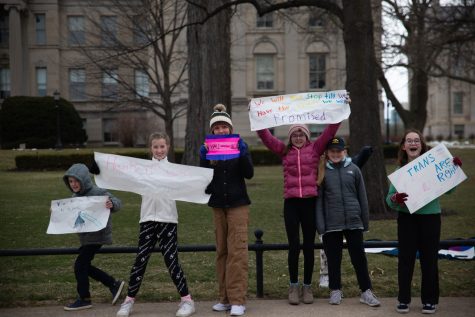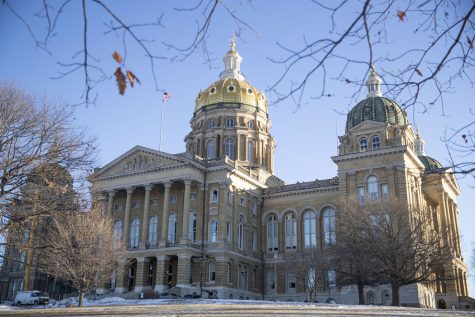Iowa legislative leadership share priorities for 2023 session
In the first official meeting of the Iowa Legislature, leaders announced their priorities for the legislative session — focusing on bi-partisian goals and working for Iowans.
Speaker of the House, Pat Grassley, R-New Hartford, takes the floor during the first day of the 90th Iowa legislative session at the Iowa State Capitol in Des Moines on Monday, Jan. 9, 2023.
January 9, 2023
DES MOINES — Iowa’s legislative leadership announced they would focus on education reform, property tax reform, and population retention rates in the state after gaveling in the first meeting of the 2023 legislative session on Monday.
Senate President Amy Sinclair, R-Allerton, started the session by touting Iowa’s past success in returning Iowa to a new sense of “normalcy”. She referenced the speed at which students were able to be back in the classroom through republican policies.
Gov. Kim Reynolds loosened pandemic restrictions by December 2020 and ended the pandemic-related federal unemployment benefit program that was in place by May. Iowa was one of seven states to terminate these benefits before July 2021. Additionally, Reynolds signed into law that state and local government agencies were prohibited from requiring their employees to receive the vaccine.
Sinclair said the pandemic caused parents to be more attentive to their child’s classroom and led to many parents adjusting their educational choices when possible.
“Our budget makes it clear that senate Republicans’ priorities have been, and will continue to be, solidly on supporting every single student’s right to reach their full potential through lifelong learning,” Sinclair said.
Last session, Reynolds introduced a bill that would give 10,000 Iowa k-12 students a voucher to use at any nonpublic school in their area. Sinclair said the bill aims to ensure that parents have a say in their students’ education.
The parental choice bill passed in the Senate in 2022, but did not make it through the House because of opposition from House Democrats and a handful of Republicans. Reynolds funded primary challenges to the Republicans who opposed the legislation in 2022.
Democrats opposed this policy in 2022, and Senate Minority Leader Zach Wahls said he opposes the parental choice voucher bill because it will increase the teacher shortage and threaten public schools.
While the number of students who transferred from Iowa public schools to an Iowa nonpublic school is uncertain, the state did see an increase in nonpublic school enrollment between December 2020 and December 2022. According to the Iowa Department of Education, enrollment in nonpublic schools increased by over 1,000 K-12 students.
“This session’s work will seek to maximize educational opportunities for all and ensure that students whose needs are not being met can find the option that best serves them,” Sinclair said. Income should not impact children’s access to educational institutions that will best fit their needs.”
Iowa House Speaker Pat Grassley, R-New Hartford, said House Republicans also plan to move forward with Reynolds’ school choice voucher bill. This bill, he said, will give parents more involvement in their child’s education while keeping the public school system strong.
Grassley said the House also intends to grow Iowa’s economy, keep families safe, and protect Iowans’ freedoms. He emphasized his priority in decreasing property taxes for Iowans.
“Oftentimes, we focus too much on providing certainty for the government and not enough time providing certainty for the taxpayer,” Grassley said.
Senate Minority Leader Zach Wahls, D-Coralville, said the number one issue facing Iowa today is the mass exodus of people leaving the state for different opportunities. Wahls said conservative policies, such as the parental choice bill and previous tax policy, are causing Iowans to flock to surrounding states leaving a teacher, childcare, nursing, and manufacturing shortage in Iowa.
In his opening remarks, Wahls encouraged the Senate to work together to alleviate Iowans of the shortages they are facing.
“Democrats are ready. We want to be a part of the solution,” Wahls said. “We want to make Iowa a destination for hardworking new newcomers and young families. We want to make Iowa a lifelong home for the next generation. The question is whether Republicans are serious about joining us.”
Senate Majority Leader Jack Whitver, R-Grimes, said Senate Republicans have found common priorities among their constituents. He said tax reform and education reform have been important priorities for Iowans.
“I can tell you, Senate Republicans are up to the challenge on the best long-term strategy for our taxpayers,” Whitver said.
A major goal for this session, Whitver said, is getting more Iowans back into the workforce through a tax code that incentivizes Iowans to work, equipping people with the skills they need, and securing public assistance programs for Iowans in need.
According to Iowa Workforce Development, the state has 1.65 million Iowans in the workforce, which is higher than this time the previous year. Iowa saw an increase in the unemployment rate, up to 3.1 percent, however, the labor force participation rate held steady at 67.7 percent.
The unemployment rate increased due to added jobs and people leaving the state, while labor force participation rate shows how many of those who remain in the state find work, according to Iowa Workforce Development.
“Today, we start the path to implement more historic reforms in Iowa. We will keep our promises, we will listen and we will continue to make Iowa a place with great schools, great opportunities, and great people,” Whitver said.
House Minority Leader Jennifer Konfrst, D-Windsor Heights, said Iowans are also passionate about the cost of living, public school investment, marijuana legalization, and reproductive freedom.
Konfrst emphasized the importance of bipartisanship and said the new legislative session is an opportunity for reaching across the aisle to benefit Iowans of any party.
“We talked to our constituents a lot about what they wanted. Let’s remember what they told us when drafting legislation. Let’s remember to put people over politics,” Konfrst said.
Liam Halawith contributed to this report.



